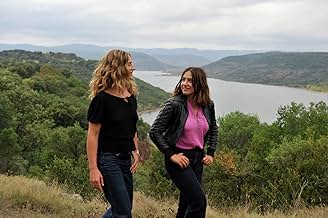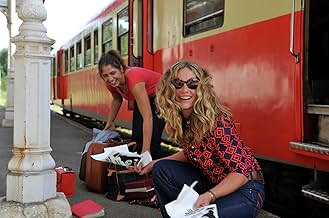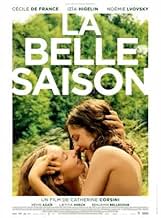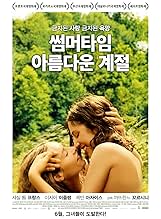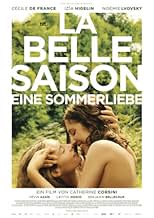AVALIAÇÃO DA IMDb
6,7/10
6,1 mil
SUA AVALIAÇÃO
Uma jovem mulher muda-se do campo francês para Paris e começa um apaixonado caso de amor com uma líder feminista neste drama ambientado na França dos anos 70.Uma jovem mulher muda-se do campo francês para Paris e começa um apaixonado caso de amor com uma líder feminista neste drama ambientado na França dos anos 70.Uma jovem mulher muda-se do campo francês para Paris e começa um apaixonado caso de amor com uma líder feminista neste drama ambientado na França dos anos 70.
- Direção
- Roteiristas
- Artistas
- Prêmios
- 3 vitórias e 8 indicações no total
Cécile de France
- Carole
- (as Cécile De France)
Natalie Beder
- Marie-Laure
- (as Nathalie Beder)
- Direção
- Roteiristas
- Elenco e equipe completos
- Produção, bilheteria e muito mais no IMDbPro
Avaliações em destaque
An enjoyable film, with some great performances; but less travelled country roads should be rather more bumpy.
While a far from novel story, the three female leads (Izïa Higelin, Cécile de France and Noémie Lvovsky) give pitch perfect performances.
Where this film falls down is in giving the two lovers, far too smooth a ride. If you're fighting for freedom, surely the establishment would offer far more resistance? Here, the revolutionaries hardly seem to experience any push-back. There's one bump in the road, but that's really it.
While a far from novel story, the three female leads (Izïa Higelin, Cécile de France and Noémie Lvovsky) give pitch perfect performances.
Where this film falls down is in giving the two lovers, far too smooth a ride. If you're fighting for freedom, surely the establishment would offer far more resistance? Here, the revolutionaries hardly seem to experience any push-back. There's one bump in the road, but that's really it.
I didn't much care for the first half of 'Summertime': a posse of beautiful, self-confident and middle-class young feminists assert their right to "to as they please" in the Paris of the 1970s. What is absent from the portrayal is any sense of the personal insecurity that cripples most of us; these sisters, it seems, can quite literally do anything for themselves. The film becomes more nuanced when it follows two of its protagonists (a lesbian couple) back to the farm in the country where one of them (Delphine) grew up, and whence she has now been summoned owing to the illness of her father. There's still some idealisation here: the family own their farm and live a simple peasant life. But the conflict between Delphine's familial and spatial sense of identity, and the new relationship she has forged in the city, is nicely portrayed, as is the guarded hostility of her mother and her local acquaintances to the choices she has made in her new life. Overall, it's not nearly as strong as 'Blue is the Warmest Colour', but it grew on me as I watched it.
This is a sensitive portrayal of two women from different backgrounds in conservative, rural France. Delphine, a country girl in Paris is introduced to feminism at a time (1971) shortly after the student riots in Paris, the bra-burning feminism of late 60s USA, and the teen-led cultural revolution in music, art and fashion. Paris was a world away from her farm in the Limousin. It is a film about feminism and lesbianism with strong female leads directed by an experienced female director who was, herself, a teenager at the time the film was set. As such it is authentic and tender, not titillating. It is a film about relationships, between Delphine and her mother, her Parisian girlfriend, the boy she is expected to marry and above all the conflict between the city and the country.
It is a film that could only be made in Europe and only set in the 70s and was justifiably nominated for a Lumiere, France's equivalent to the Golden Globes. Jellybeansucker should stick to sucking jelly beans and watching simplistic action movies. This is for those who prefer content to pace.
It is a film that could only be made in Europe and only set in the 70s and was justifiably nominated for a Lumiere, France's equivalent to the Golden Globes. Jellybeansucker should stick to sucking jelly beans and watching simplistic action movies. This is for those who prefer content to pace.
This story of a relationship between a farmer's daughter and the woman she meets in Paris is effective in some ways. Set in the early 70s in the first flush of modern feminism, the plot is pretty simple and the issue simpler - will they stay together against the pressures of rural society? Izia Hegelin makes an effective and believable daughter of the soil, struggling to reconcile her feelings and her ties to her land and family; in an underwritten role as her lover, Cecile de France is less effective but does her best. Some good scenes showing the sometimes silly behaviour of activists and their disconnect from real life. The ending seemed slightly unlikely to me in some ways. There are sex scenes but they are neither very erotic nor graphic. So - worth seeing, but only a moderately good film.
LGBT rights are more relevant than ever. In several countries, unfortunately, the trend is towards more difficult living conditions for gays and transgender people. Seen in such a perspective, the plot of this film remains relevant, despite the fact that it depicts a summer in 1971.
Although perhaps the problem here is something we have seen in many films, the film is experienced as both engaging and well told.
I sat thinking when I saw this movie; how many such fates exist? Both before and now? That people cannot live their lives to the fullest, in fear of condemnation from their surroundings. There are probably a lot of them, and in that way such films become important and unfortunately relevant. For such films we need. We need to be reminded of how the world treats and views queer people. In addition to a strong and pointed action, the film is also beautifully filmed, well directed and with good actors who get both convincing and engaging.
Você sabia?
- CuriosidadesDirector Catherine Corsini stated that she named the two main characters Carole and Delphine after real life artists and feminists Carole Roussopoulos and Delphine Seyrig.
- Erros de gravaçãoAfter a swim in the pond, the girls lay out to take some sun. As Carole lays naked on the blanket resting her head on Delphine, her arms are raised and we can see she does not have any underarm hair. As the girls start to kiss and caress Carole's armpit is exposed again but this time full of underarm hair.
- ConexõesReferenced in Théo e Hugo (2016)
- Trilhas sonorasL'Hymne du MLF, d'apres Le Chant des Marais
(Johann Esser/Wolfgang Langhoff/Rudi Goguel)
With the kind permission of Edition Peters Group
All rights reserved
Principais escolhas
Faça login para avaliar e ver a lista de recomendações personalizadas
- How long is Summertime?Fornecido pela Alexa
Detalhes
- Data de lançamento
- Países de origem
- Central de atendimento oficial
- Idiomas
- Também conhecido como
- Summertime
- Locações de filme
- Haute-Vienne, França(scenes in the country)
- Empresas de produção
- Consulte mais créditos da empresa na IMDbPro
Bilheteria
- Orçamento
- € 4.800.000 (estimativa)
- Faturamento bruto nos EUA e Canadá
- US$ 35.322
- Fim de semana de estreia nos EUA e Canadá
- US$ 15.413
- 24 de jul. de 2016
- Faturamento bruto mundial
- US$ 3.778.938
Contribua para esta página
Sugerir uma alteração ou adicionar conteúdo ausente

![Assistir a Bande-annonce [OV]](https://m.media-amazon.com/images/M/MV5BMzZiZTVkNWItZGNjYS00ZDY2LWFkOGItZjhkNTk2NDQ3ZDE2XkEyXkFqcGdeQXRyYW5zY29kZS13b3JrZmxvdw@@._V1_QL75_UX500_CR0)


